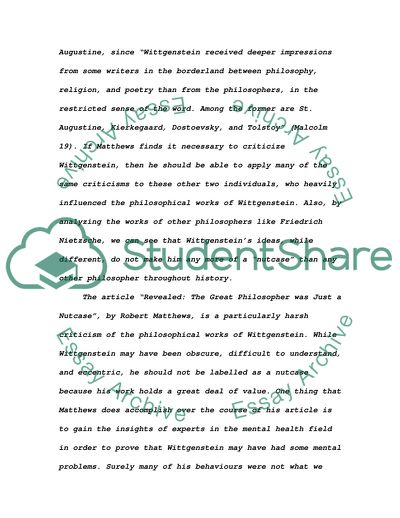Cite this document
(Robert Matthews and The Daily Telegraph Essay Example | Topics and Well Written Essays - 4500 words, n.d.)
Robert Matthews and The Daily Telegraph Essay Example | Topics and Well Written Essays - 4500 words. Retrieved from https://studentshare.org/literature/1713567-wittgenstein-a-evaluation-and-response-to-mr-robert-matthews-telegraph-article-march-10-1991
Robert Matthews and The Daily Telegraph Essay Example | Topics and Well Written Essays - 4500 words. Retrieved from https://studentshare.org/literature/1713567-wittgenstein-a-evaluation-and-response-to-mr-robert-matthews-telegraph-article-march-10-1991
(Robert Matthews and The Daily Telegraph Essay Example | Topics and Well Written Essays - 4500 Words)
Robert Matthews and The Daily Telegraph Essay Example | Topics and Well Written Essays - 4500 Words. https://studentshare.org/literature/1713567-wittgenstein-a-evaluation-and-response-to-mr-robert-matthews-telegraph-article-march-10-1991.
Robert Matthews and The Daily Telegraph Essay Example | Topics and Well Written Essays - 4500 Words. https://studentshare.org/literature/1713567-wittgenstein-a-evaluation-and-response-to-mr-robert-matthews-telegraph-article-march-10-1991.
“Robert Matthews and The Daily Telegraph Essay Example | Topics and Well Written Essays - 4500 Words”. https://studentshare.org/literature/1713567-wittgenstein-a-evaluation-and-response-to-mr-robert-matthews-telegraph-article-march-10-1991.


